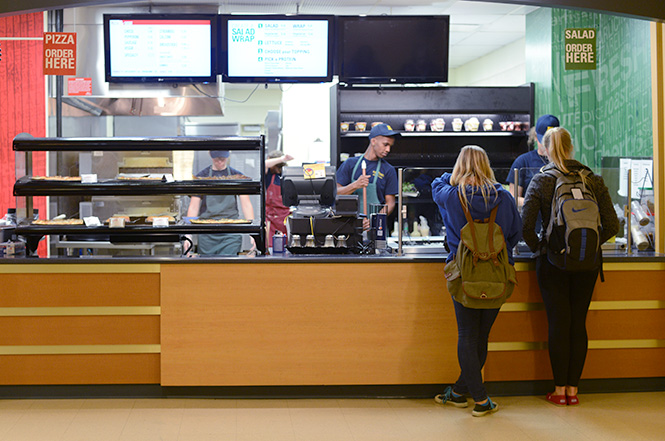Meal swipes expand to downtown, campus dining update
Kent State students order salads, a healthier option, at “The Slice” in the Hub on Thursday evening, Oct. 16, 2013. Photo by Melanie Nesteruk.
April 23, 2022
After a rocky year for university culinary services, students will have additional options to look forward to during the fall 2022 semester.
More locations are anticipated to open in the Student Hub, including The Patio Express. Concessions at sporting events will also be updated. Other changes include a five-week menu cycle. DI Hub and Rosie’s are planning to expand hours, the latter of which is looking at opening for breakfast along with a menu expansion.
“It will be completely different than this past fall,” said Sommer Dunlevy, the associate director of marketing for the university. “I will say that flat out.”
A new meal plan allowing freshmen and sophomores to swipe their cards at certain downtown restaurants was also created for fall as a flexible alternative to the current plans, which they are required to purchase. Exclusive to the Flash 200 Block plan is $300 in declining balance, $100 in downtown dining dollars and 200 meal swipes, compared to current meal plans which offer unlimited swipes.
These changes are necessary, said Eliot Norris, the associate director of culinary services and campus executive chef, in order to ensure students get the most out of dining on campus.
In July of 2021, the university cut ties with its previous provider Aramark, opting to do in-house dining instead. However, building a new program from the ground up was not an easy task nor without controversy. Just a few days into the fall 2021 semester, photos of alleged raw chicken, unappetizing meals and posts and memes expressing frustration with campus dining started popping up across social media.
Adam Petric, a senior computer science major who had a meal plan since starting at Kent State, is blunt when it comes to his opinion of the transition; “It’s just been a complete disaster so far,” he said.
Petric is not usually one to take part in protests, but when a photo of him holding a “Feed us Todd” sign at an October 2021 rally against food quality in dining halls went viral across campus, it spoke for many frustrated students – including over 5,000 who signed a Change.org petition demanding meal plan refunds.
“It certainly wasn’t a strong way to come out of the gate, but we owned that and took responsibility,” said Jill Jenkins, the senior executive director of university housing and culinary services.
While many students expect a full-fledged, experienced dining operation when coming to college, it was all very new to the people behind it. Culinary services had to build new menus, a new website, face supply chain issues due to the pandemic as well as having zero student employees at the start of the fall 2021 semester. Even the new executive chef began work just nine days before dining halls opened.
“There was a lot of, ‘Your feet are here, go!’ and it was just a lot of kind of figuring it out as we went along,” Norris said. “And it certainly, I think, didn’t go how anybody had envisioned.”
As student frustration grew, responding to and addressing their concerns quickly became a priority for the department. In response, a texting service was set up for students to share their thoughts on meals and forums were held for the university to gather more input from students.
“[We] had a lot of conversations, a lot of correspondence with students … we didn’t hide from that,” Jenkins said.
A part of those conversations was gaining back the trust students lost for on-campus dining and setting reasonable expectations for what the university would be capable of.
“I think we took a lot of pride from putting together what we did, that being said, we also recognize that was not a good opening and have been, I think, pretty aggressively trying to both change the sort of trust that was lost, like initially, as well as the perception of our dining halls,” Norris said.
Culinary services began making changes according to student input by expanding the meal variety from a three-week menu cycle to a four-week menu cycle. They also made menus available online, increased vegan and vegetarian options, expanded the hours of some dining locations such as Rosie’s and ensured that food is properly handled and cooked.
Still, one issue continued to gain traction on campus. Prior to the fall semester, Kent State offered completely gluten-free meals at its café in Prentice Hall, which was closed due to a decision made months before the Aramark separation. The university moved to serve meals made without gluten at stations in Eastway and DI Hub, but some students with celiac disease who chose to come to the university because of the safe environment in Prentice did not feel comfortable with the risk of cross contamination.
One of these students, Jaclyn Brooks, heavily petitioned the school to better accommodate students who could not eat gluten. She ultimately moved to cooking her own food instead of dining on campus, a situation she tried to avoid.
Culinary services, along with student accessibility services and the campus dietitian, held focus groups specifically for students with celiac. Since Prentice could not be refurbished as a dining hall due to the structural upkeep, students with gluten intolerance had to work with SAS on creating individual solutions and refunding meal plans. Establishing a new gluten-free dining hall is something of future interest for culinary services.
“It’s something we are actively sort of investigating to try and see what that looks like in the future,” Norris said.
Still, Petric believes more can be done for students.
“There have been slight improvements,” he said. “It has gone from a complete disaster to kind of mediocre.”
The process of revamping Kent’s dining experience will be a long one, and culinary services is only in the beginning of making that transition.
“An operation this size, it’s a cruise ship, it’s not a speedboat,” Norris said. “It’s going to take us a long time to turn the ship. We’ll get there.”
Alton Northup is a reporter. Contact him at [email protected].













